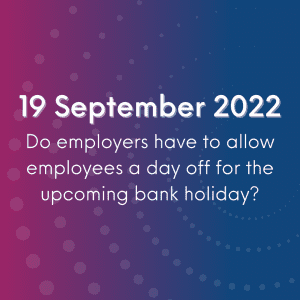We are all saddened to hear about the passing of Her Majesty, The Queen. She was the best example of a great leader with resilience and humility who genuinely earned the respect of the world.
Do employers have to allow employees a day off for the upcoming bank holiday?
The funeral will be held on Monday 19th September 2022 and this day has been declared a bank holiday.
What does this mean for employers? Do they have to honour it?
We have answered your questions below.
Can I make employees work on bank holidays?
Public holidays or bank holidays are part of the 5.6 week entitlement (WTR 1998) so there is no statutory entitlement to allow employees to have them off on a bank holiday provided they receive the minimum statutory entitlement throughout the course of the year.
If the government declare a day to be a public or bank holiday outside the normal 8 days, do I have to honour this?
This depends on what your holiday policy or contracts of employment state. Here is an overview of some options:
- The policy might say ‘Your annual holiday entitlement (inclusive of bank and public holidays) is … days’: this would mean that you could require employees to take the day as part of their current entitlement or allow them to take it unpaid
- The policy might also say ‘In addition to bank and public holidays, your annual entitlement to holidays is … days’: this would mean you might need to pay for any additional public holidays unless the policy states ‘usualbank and public holidays’ in which case, you could arguably not pay employees if the government declare a ‘new’ bank holiday.
- Your policy might say ‘statutory entitlement plus bank holidays’ this would entitle them to 28 days plus the public and bank holidays so you would have to pay them for the new bank holiday.
- If you contractually oblige employees to work public holidays then there is no entitlement to any time off if a ‘new’ bank holiday is declared.
Check your contracts for these!
No express contractual provision?
The employee may have an implied right to a days paid holiday on recognised public holidays (Tucker v British Leyland Motor Corporation [1978] IRLR 493). However, it is likely that this would only be the case if it was established custom and practice in the business. Basically, what this means is be consistent with what you normally offer and the ‘one off’ bank holiday.
If employees are required to work on the bank holiday, are they entitled to a day off in lieu?
An employer will need to decide whether they will allow an additional day off if there is no contractual entitlement to the holiday. This is at the employers discretion.
If an employee already has a day off booked for the new bank holiday, will they be entitled to reclaim a day back?
This is a decision for the employer to make, however if an employer is honouring the bank holiday for other staff members, then it would only seem fair that it is honoured for all staff. This should be discussed with your employer.
Some other considerations:
1. Part time employees
Part time employees have a right not to be treated less favourably than full time employees (Part-time Workers (Prevention of Less Favourable Treatment) Regulations 2000). To ensure fair treatment, it is best to give them a pro-rata entitlement of the public holidays regardless of whether or not they would normally work on that day.
2. Extra pay?
There is no statutory right to extra pay on bank holidays. This is again dependant on the provisions within the contract of employment and again will depend on the wording as to whether any one-off declared bank holidays give rise to any enhanced pay.
3. Child Care?
Schools will most likely be closed on the bank holiday which may make child care difficult for some employees to arrange.
4. Public Transport
There will most likely be a reduced service on public transport on the bank holiday which could affect some employees travelling into work.
For expert advice on any aspect of employment law and HR call us on 0333 888 1360 or email hello@bhayanilaw.co.uk
We are in Your Corner
For advice or for a free assessment contact us today








